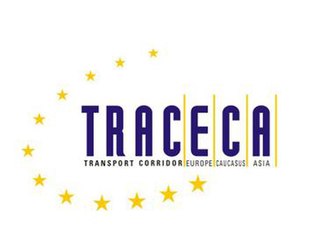Related Research Articles

The United Nations Economic Commission for Europe is one of the five regional commissions under the jurisdiction of the United Nations Economic and Social Council. It was established in order to promote economic cooperation and integration among its member states.

Transport in Europe provides for the movement needs of over 700 million people and associated freight.

The Trans-European Transport Network (TEN-T) is a planned network of roads, railways, airports and water infrastructure in the European Union. The TEN-T network is part of a wider system of Trans-European Networks (TENs), including a telecommunications network (eTEN) and a proposed energy network. The European Commission adopted the first action plans on trans-European networks in 1990.

The Directorate-General for European Civil Protection and Humanitarian Aid Operations, formerly known as the European Community Humanitarian Aid Office, is the European Commission's department for overseas humanitarian aid and for civil protection. It aims to save and preserve life, prevent and alleviate human suffering and safeguard the integrity and dignity of populations affected by natural disasters and man-made crises. Since September 2019, Janez Lenarčič is serving as Commissioner for Crisis Management in the Von der Leyen Commission, and since 1 March 2023, Maciej Popowski leads the organisation as the Director-General.

The MEDIA sub-programme of Creative Europe or simply Creative Europe MEDIA is designed to support the European film and audiovisual industries.

The Directorate-General for Communications Networks, Content and Technology is a Directorate-General of the European Commission and is responsible for European Union investment in research, innovation and development of critical digital technologies.

Banedanmark is a Danish company that is responsible for the maintenance and traffic control on all of the state owned Danish railway network.

The Directorate-General for Research and Innovation is a Directorate-General of the European Commission, located in Brussels, and responsible for the European Union's research and innovation policy and coordination of research and innovation activities. Until her resign in May 2023, DG RTD was headed by Commissioner Mariya Gabriel and Director-General Marc Lemaître.

The Directorate-General for Mobility and Transport is a Directorate-General of the European Commission responsible for transport within the European Union.
The European Education and Culture Executive Agency, or EACEA, is an executive agency of the European Commission located in Brussels, Belgium. It manages parts of the European Commission's funding programmes in education, culture, media, sport, youth, citizenship and humanitarian aid. EACEA has been operational since January 2006.
The Executive Agency for Small and Medium-sized Enterprises (EASME) is an Executive Agency of the European Commission. EASME was founded in 2003 as the Intelligent Energy Executive Agency (IEEA) and was renamed the European Agency for Competitiveness and Innovation (EACI) in 2007, finally becoming EASME in 2014. It is responsible for managing specific programmes in the fields of energy, the environment, and business support. Its goal is to promote sustainable development while improving the competitiveness of European industries. While the Agency has its own legal identity, it reports to several Directorates-General of the European Commission, which remain responsible for programming and evaluation of the programmes.
The Framework Programmes for Research and Technological Development, also called Framework Programmes or abbreviated FP1 to FP9, are funding programmes created by the European Union/European Commission to support and foster research in the European Research Area (ERA). Starting in 2014, the funding programmes were named Horizon.

TRACECA is an international transport programme involving the European Union and 12 member states of the Eastern European, Caucasus, and Central Asian region. The programme aim is to strengthen economic relations, trade, and transport in the regions of the Black Sea basin, South Caucasus, and Central Asia. It has a permanent Secretariat, originally financed by the European Commission, in Baku, Azerbaijan, and a regional office in Odesa, Ukraine. Since 2009, the organization has been entirely financed by member countries.
The United Kingdom Space Agency (UKSA) is an executive agency of the Government of the United Kingdom, responsible for the United Kingdom's civil space programme. It was established on 1 April 2010 to replace the British National Space Centre (BNSC) and took over responsibility for government policy and key budgets for space exploration; it represents the United Kingdom in all negotiations on space matters. The Agency "[brings] together all UK civil space activities under one single management". It is based at the former BNSC headquarters in Swindon, Wiltshire.

The National Infrastructure Commission is the executive agency responsible for providing expert advice to the UK Government on infrastructure challenges facing the UK.

The Trans-European Transport Network Executive Agency was an executive agency established by the European Commission in October 2006 in order to realise the technical and financial implementation of the TEN-T programme. It ceased its activities on 31 December 2013 and was superseded by the Innovation and Networks Executive Agency (INEA).
The Connecting Europe Facility (CEF) is a European Union fund established in 2014 for infrastructure investments across the union in transport, energy, digital and telecommunication projects, which aims at a greater connectivity between EU member states. It operates through grants, financial guarantees and project bonds. It is run by the Innovation and Networks Executive Agency and then by the Climate, Infrastructure and Environment Executive Agency.
The European Research Executive Agency is a funding body mandated by the European Commission to support the EU Research and Innovation policy. It has been established by the European Commission, based on Council Regulation (EC) No 58/2003.
The European Climate, Environment and Infrastructure Executive Agency (CINEA) is the European Commission agency which manages decarbonisation and sustainable growth. It is the successor organisation of the Innovation and Networks Executive Agency (INEA). Established on 15 February 2021, with a budget of €50 billion for the 2021-2027 period, it started work on 1 April 2021 in order to implement parts of certain EU programmes. The Agency will have a key role in supporting the European Green Deal, with a focus on creating synergies to support a sustainable, connected, and decarbonised Europe.
The Digital Europe Programme (DEP) is a fund of the European Union which supports the completion of the Digital Single Market by connecting Europe through 'digital bridges' for the benefit of citizens, businesses and public administrations. It promotes the vision of public services being not only digital by default but also cross-border by default.
References
- ↑ "Innovation and Networks Executive Agency". Innovation and Networks Executive Agency - European Commission.
- ↑ "Innovation & Networks Executive Agency (INEA) - European Commission". Archived from the original on 2017-01-06. Retrieved 2017-01-05.
- ↑ Taylor, Ian (25 March 2021). "EUROPE: INEA name change to reflect key Green Deal role". Bunkerspot - Independent Intelligence for the Global Bunker Industry. Retrieved 2021-04-24.